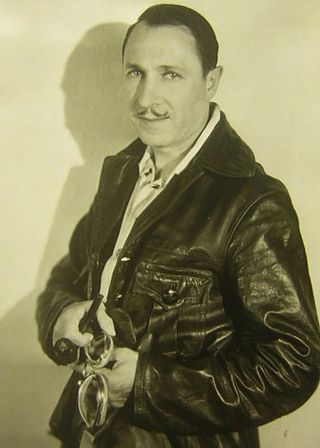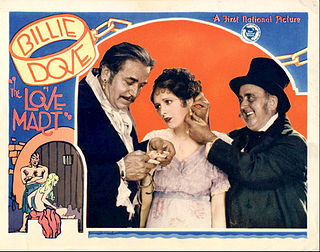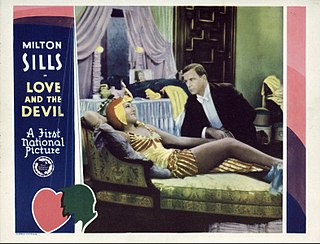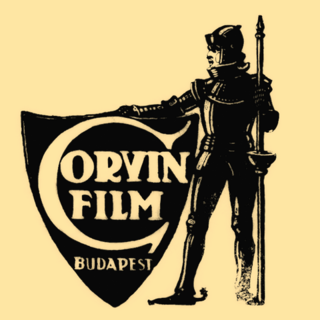
Sir Alexander Korda was a Hungarian–born British film director, producer and screenwriter, who founded his own film production studios and film distribution company.

Armand David Kali(s)z was an American stage and film actor of the silent film and early sound period of the 1930s. Prior to that, he was an actor in vaudeville and on the legitimate stage.

The Love Mart is a 1927 American silent drama film directed by George Fitzmaurice starring Billie Dove, Gilbert Roland and Noah Beery, and featuring Boris Karloff. The film is lost.

The Prince and the Pauper is a 1920 Austrian silent adventure film directed by Alexander Korda and starring Tibor Lubinszky, Albert Schreiber, and Adolf Weisse. It is based on Mark Twain's 1881 novel The Prince and the Pauper about a poor boy who switches places with Edward, Prince of Wales in Tudor England.
Masters of the Sea is a 1922 Austrian silent adventure film directed by Alexander Korda and starring Victor Varconi, María Corda and Tibor Lubinszky.
White Rose is a 1919 Hungarian silent drama film directed by Alexander Korda and starring María Corda, Gyula Bartos, and Emil Fenyvessy. It was based on an 1853 novel by Mór Jókai. It was released by the state-owned Hungarian film industry during the Hungarian Soviet Republic, although production had begun before the regime came to power. Korda went on to make two further films for the Soviet government Yamata and Ave Caesar! which led to his eventual arrest once the regime had been overthrown and his ultimate decision to leave Hungary for Austria.

Yellow Lily is a 1928 American silent drama film directed by Alexander Korda and starring Billie Dove, Clive Brook and Gustav von Seyffertitz. The film closely followed the formula of Korda's first American film The Stolen Bride.
Faun is a 1918 Hungarian silent drama film directed by Alexander Korda and starring Gábor Rajnay, Dezsõ Gyárfás and Artúr Somlay. It was based on a play by Edward Knoblock.
The Stork Caliph is a 1917 Hungarian silent drama film directed by Alexander Korda and starring Gyula Bartos, Oscar Beregi Sr. and Judit Bánky. It was the second film made by Korda for his newly established Corvin Film company. He pulled off what was considered a literary coup by persuading the author Mihály Babits to allow him to film a version of his 1916 novel of the same name.
Harrison and Barrison is a 1917 Hungarian silent comedy film directed by Alexander Korda and starring Márton Rátkai, Dezsõ Gyárfás and Nusi Somogyi. Korda broke from his previous practice of adapting literary works, to direct an original screenplay. The film's style is a madcap one, which relied on the talents of its two stars Rátkai and Gyárfás who were popular comedians. It was Korda's most famous Hungarian film, better known than his literary adaptions. Korda himself considered the film his best work of the period.
St. Peter's Umbrella is a 1917 Hungarian silent drama film directed by Alexander Korda and starring Károly Lajthay, Márton Rátkai and Victor Varconi. It was an adaptation of the 1895 novel St. Peter's Umbrella by Kálmán Mikszáth. Two adaptations were made later in 1935 and in 1958.

Night Watch is a 1928 American drama film directed by Alexander Korda and starring Billie Dove, Paul Lukas and Donald Reed. It was an adaptation of the dramatic 1921 play In the Night Watch, written by Michael Morton. The film is set almost entirely on a French warship at the beginning of the First World War. Although largely a silent film, Night Watch was the first of Korda's films to feature a synchronized score and sound effects but no dialogue using the Vitaphone sound system.

Love and the Devil is a 1929 American sound drama film directed by Alexander Korda and starring Milton Sills, María Corda and Ben Bard. While the film has no audible dialog, it was released with a synchronized musical score with sound effects using the sound-on-disc Vitaphone process.

The Squall is a 1929 American pre-Code drama film directed by Alexander Korda and starring Myrna Loy, Richard Tucker, Alice Joyce and Loretta Young, and based on the 1926 play The Squall by Jean Bart.

Her Private Life is a surviving 1929 American pre-Code drama film directed by Alexander Korda and starring Billie Dove, Walter Pidgeon and Holmes Herbert. The plot concerns an English aristocrat who causes a scandal when she divorces her husband and runs off with a young American. The film had been considered a lost film. However, in July 2016, according to the Library of Congress, the film was found in an Italian archive.
Mary Ann is a 1919 Hungarian silent drama film directed by Alexander Korda and starring Ica von Lenkeffy, Tivadar Uray and Dezső Gyárfás. It was based on the play Merely Mary Ann by Israel Zangwill.
White Nights is a 1916 Hungarian silent drama film directed by Alexander Korda and starring Lili Berky, Kálmán Körmendy and György Kürthy. It was based on the play Fédora by Victorien Sardou and is sometimes known by the alternative title Fédora. It was Korda's first film for the Corvin Film studio. It was a major success and was one of the first Hungarian films to be exported to other countries.

The Corvin Film Studio established in 1916, was the largest film production company in Hungary, while the third-largest film company in Europe in the era of silent film. Their films were characterized by a high standard of literature and excellent artistic preparation.
Tutyu and Totyo is a 1915 Hungarian silent film directed by Alexander Korda and starring Gusztáv Vándory.
Cyclamen (Hungarian:Ciklámen) is a 1916 Hungarian silent film directed by Alexander Korda.










